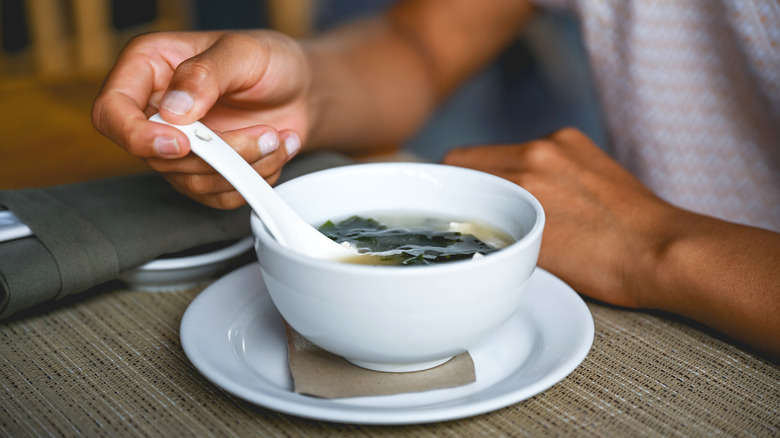Fight Seasickness On Your Next Cruise With This Helpful Food Combo
Seasickness — it's the bane of every cruise enthusiast's existence. Imagine enjoying your time at sea and enjoying the spectacular views of the glistening waters, only to be hit by a dizzying sensation, along with the urge to hurl your guts out. According to the National Ocean Service, the awful sensation typically strikes within the first 12 to 24 hours of the voyage. It's an experience everyone would rather avoid, but surprisingly, kicking it to the curb can be as simple as consuming ginger and pretzels.
This combo is almost unheard of and likely not something you'd instinctively reach for yourself. But if you're in a pinch with no access to medication like Dramamine, the two can help. Ginger, in particular, has long been a seasick sailor's secret weapon, as per Dr. James Duke, a former expert on medicinal plants at the U.S. Department of Agriculture, via The Washington Post. "Legend has it that commercial fishermen at sea would chew on a slug of ginger root to ward off decidedly unprofitable bouts of seasickness," he said. And the unassuming pretzels? While they may be bland, they're a great antidote to overwhelming queasiness, per Healthline.
The good news is you don't necessarily have to bring them and weigh down your luggage with these items. Your cruise ship likely has them in stock in various forms (think ginger ale and ginger beers), so you can quickly grab them when you start to feel uneasy.
The science behind the combo
You might be thinking: Do ginger and pretzels have magical properties that render them capable of keeping seasickness at bay? Well, yes, if you deem science as magic. For instance, a 2015 study published in the European Review for Medical and Pharmacological Sciences found that ginger can also aid in preventing nausea not just brought about by seasickness but also by pregnancy and chemotherapy.
Another 2015 study published in Phytochemistry noted that this is all thanks to gingerols and shogaols, compounds that do more than just soothe the stomach. They were also found to reduce inflammation and alleviate arthritis and pain. You don't even have to chew raw ginger to reap these benefits — you can down a 12-ounce can of ginger ale or ginger beer, which Dr. James Duke told The Washington Post can match the efficacy of 50 to 100 milligrams of Dramamine. Powdered ginger root works, too, along with ginger candy.
Meanwhile, pretzels and other bland food items, like saltine crackers, can neutralize the stomach acids that trigger nausea. "The bland nature of a cracker helps to satisfy hunger (excessive hunger can exacerbate nausea) without the strong smells or tastes that may increase nausea," Erin Palinski-Wade, a registered dietician, explained to Everyday Health. "Starchy foods may also help to absorb stomach acids and settle your stomach." Just be careful about consuming them; you don't want to eat too many crackers at once. Instead, chew thoughtfully to help your tummy acclimate to the food.
Other food items for motion sickness
Aside from consuming ginger and pretzels, experts recommend resorting to food that your stomach can easily agree to, like chicken noodle soup and bagels. But whatever you do, steer clear of spicy and greasy dishes and those rich in flavor, as they can only exacerbate your symptoms. "These harder-to-digest foods increase the chances that you'll throw up," Dr. Jennifer Derebery, a physician and ear disorder specialist, told The New York Times.
If you're sensitive to pungent smells, which can intensify nausea, choosing cold foods can be a smart move as they generally emit milder scents, according to Healthline. You can reach for yogurt, ice cream, chilled fruits, or even ice cubes if you're struggling with solid foods. Food high in protein and fiber, like apples and nuts, also helps, as do those packed with potassium, like bananas. In situations where you feel low on energy and nutrients, sports drinks can do the trick. "Small sips of electrolyte-rich beverages are appropriate to promote hydration and replenish electrolytes lost during vomiting," Erin Palinski-Wade told Everyday Health.


